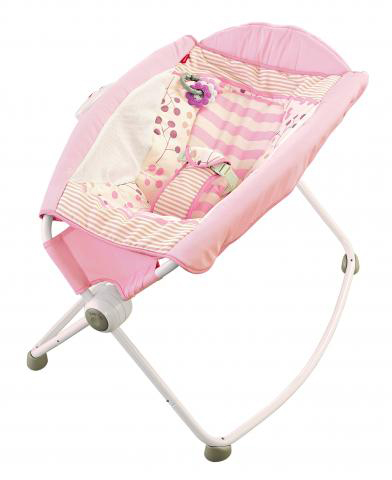Posts Tagged ‘“Boston product liability lawyer”’
After Millions of Recalls, New Safety Standard Proposed for Infant Sleepers
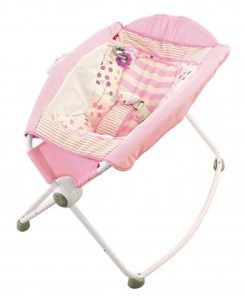
Fisher-Price recalled its Rock ‘n Play sleeper in April.
Last April, Fisher-Price made its jarring announcement: 10 babies had died in its sleepers after rolling from their backs to their stomachs. Fisher-Price urged parents to take children out of the sleepers once they reach 3 months old or begin turning themselves over.
This advisory didn’t stand. Soon thereafter, Consumer Reports published the results of its own investigation, which identified 32 infant deaths. Within the week, Fisher-Price and Mattel, its parent company, had recalled 4.7 million unsafe sleepers.
Now six months later, The Washington Post reports that 59 babies have died in Rock ‘n Play sleepers. At least two other companies, Kids II and Dorel Juvenile Group USA, have recalled their infant sleeper products. At the time of the recall, 5 infants had died on the Kids II sleepers.
Last week, the Consumer Product Safety Commission (CPSC) proposed a new safety standard for infant sleep products. This would limit the seat back angle for sleep to 10 degrees or less.
Why Was the Fisher-Price Rock ‘n Play So Dangerous?
Fisher-Price introduced the Rock ‘n Play in 2009, inventing the category of inclined sleepers, which allowed babies to sleep at a 30 degree angle. From the start, this design completely disregarded the American Academy of Pediatrics’ safe-sleep guidelines, which recommend babies sleep on their backs in an empty crib or bassinet to avoid accidental suffocation.
One problem was Fisher-Price didn’t do thorough safety testing or consulting with medical experts. But you can’t overlook the fact that Fisher-Price has been a giant in children’s products and how that influenced the discussion. As one pediatrician told The Washington Post, “This is not something I’d recommend using. But parents see that it’s from Fisher-Price and think, ‘They wouldn’t be able to sell anything that isn’t safe.’ ”
New Research Findings
The CPSC asked an assistant professor of orthopedic surgery who specializes in infant biomechanics to lead a study on inclined sleep products. The professor is based at the University of Arkansas for Medical Sciences. She and her team found evidence that babies age 2-6 months on average who were placed in inclined sleep products were at a higher risk of suffocation, when compared to a flat crib mattress.
- Her team concluded that none of the inclined sleep products tested were safe for infant use.
- The university team suggested the angle of the incline be no more than 10 degrees. The lying surface should be flat and rigid, not soft or plush-like.
- The team reported that babies who were placed on their stomach in their sleepers or who rolled over had to exert as much as 200 percent more core strength than those on a flat crib mattress.
- Finally, the university team reviewed police reports and interviews from 91 cases of infant suffocation. In many cases, the caretaker reported they had never seen the infant roll over before.
This was a recurring point in the team’s findings. Many of the children were rolling over for the first time when they were found.
Here is additional information for further reading:
UAMAS Research into Baby Biomecanics Shows Issues with Infant Inclined Sleepers, University of Arkansas
After Infant Deaths, Fisher-Price Rock ‘n Play Sleeper is Recalled, Massachusetts Injury Lawyer Blog
More Infant Sleep Products Linked to Deaths, Consumer Reports
Consumer Product Safety Commission: No More Inclined Sleepers, Chicago Sun Times
Free Consultation – Boston Product Liability Lawyers
With more than 100 years combined experience, Breakstone, White & Gluck specializes in plaintiff representation in product liability cases. We represent clients throughout Massachusetts, from Boston to Cambridge to Plymouth, Brockton and Cape Cod to the North Shore.
If you have been injured, learn your legal rights. For a free legal consultation, contact our firm at 800-379-1244 or 617-723-7676. You can also use our contact form.
The Holiday Toy “Don’t Buy” List
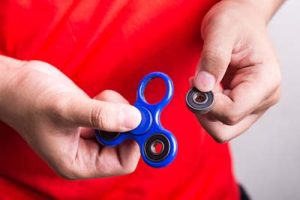
Fidget spinners have been one of the most popular gifts of 2017, but the small pieces can fall out and cause a child to choke.
By now, the children in your life have probably sent you their holiday toy wish lists. But just as important is the holiday “don’t buy” list.
W.A.T.C.H. released nominees for its “10 Worst Toys of 2017” list in mid-November, leading with Hallmark’s “Ittys Bitty” Baby Stacking Toy. This toy was recalled by the Consumer Product Safety Commission (CPSC) in August. The fabric hats and bows on the Disney characters can detach and cause a young child to choke. This toy also has no safety warnings or age recommendations.
Toy 2: Tolo’s Tug Along Pony. This toy is marketed for children 12 months and older. It has a 19-inch cord, which is permitted for pull-along toys. But W.A.T.C.H. says this toy poses a strangulation hazard and does not carry any safety warnings.
Toy 3: The Wonder Woman Battle-Action Sword. This toy is recommended for children age 6 and up. Before you buy, note that the sword is large and sharp enough to cause facial or impact injuries. The packaging also gets a failing grade. It encourages children to “fight alongside men in a war to end all wars.”
Safety Checklist: Check Your Baby Strollers and Other Children’s Products Before Spring
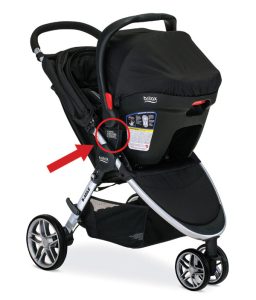 As Spring approaches, parents will be reaching for outdoor toys and children’s equipment. Baby strollers are one of the first products to come out.
As Spring approaches, parents will be reaching for outdoor toys and children’s equipment. Baby strollers are one of the first products to come out.
Before you use a stroller, check for loose or worn parts. Then find out if the stroller has been subject to a product recall or caused injury. You can check online now on the Consumer Product Safety Commission website.
Baby Stroller Recalls. We started with baby strollers because there have been several baby strollers recalled in the past year, including Britax, Aria Child and Phil & Teds strollers. Britax has actually issued two sets of recalls over the past 15 months, one for 60,000 strollers in January 2016 and another for more than 700,000 strollers in February 2017.
In December 2016, Aria Child recalled 29,000 strollers, instructing consumers to stop using the products and contact the company for a free replacement. Five consumers were pinched by the hinge mechanism of the $180 stroller. Four of these consumers needed stitches for cuts. In addition, 71 strollers malfunctioned, by folding unexpectedly during use. Twelve adults and children suffered bumps or bruises. One adult fell and fractured a wrist and elbow.
In February, Britax Child Safety Inc. recalled more than 700,000 strollers, including the Britax B-Agile and BOB Motion strollers. The strollers had defective mounts which attached to the car seat carrier. Britax received 44 reports of car seats detaching and 26 injuries including scratches, bruises and bumps to the head. More than 1,300 receiver mounts on strollers were damaged. Britax has instructed parents not to use the strollers with the travel system and to contact the company for a repair kit.
Check for Other Recalls. As consumers, we are not always aware of recalls, especially if products are passed down or are not registered with the manufacturer. Make it an annual routine to check on product recalls each Spring before your child starts using them.
Checklist of Toys and Children’s Products to Check for Safety Before Spring
Dressers. Ikea recalled 29 million dressers in June 2016, following the deaths of six children. The Consumer Product Safety Commission recommends parents always secure dressers to a wall.
Lane Furniture. The Lane Furniture recall of cedar chests is a painful topic for many people in Massachusetts. We only include it here as an example of a product which has been recalled, yet continues to harm consumers.
In 2014, two children from Franklin, Mass. tragically suffocated while playing and becoming trapped in a Lane Furniture cedar chest which had been recalled because the latch was unsafe. This was not the first time a child was killed. According to the Consumer Product Safety Commission, 34 children have become trapped and died in similar chests since 1996. Lane Furniture had first recalled 12 million of the cedar chests in 1996. But many chests are likely still in use with the dangerous latch in place, in homes, in storage and consignment shops. They are so dangerous because they are nondescript and would not stand out to many consumers.
Car Seats. Car seats or child passenger safety seats are a source of frustration for many parents. If you are struggling with yours, check online to see if it has been recalled. Millions of parents were impacted by the Graco car seat recalls in recent years. The buckles in these car seats were defective, forcing parents to cut the straps to free children in some cases.
Outdoor Toys to Check. This time of year, make sure to also check for recalls related to swingsets, bicycles, pools and other outdoor toys. Even if these products are not recalled, carefully inspect them. They age; repair any broken pieces. Throw away products which are broken and could cause injury. Remember, if a product can harm your child, it can cause someone else injury. Take it apart before you throw it away.
Conclusion
In a perfect world, you would not have to inspect your children’s products periodically or check for product recalls. Manufacturers have a responsibility to properly design and test products and should take those steps. When they do not, they can be found liable for injuries resulting from defects. They may also be subject to government investigation and fines.
About Breakstone, White & Gluck
The Boston product liability attorneys at Breakstone, White & Gluck have over 100 years combined experience representing those injured by defective products and medical devices. In recent years, we have obtained settlements of $1.15 million and $2.5 million for individuals injured by defective products or products which were misused.
If you have been injured, learn your rights. For a free legal consultation, contact us at 800-379-1244 or 617-723-7676 or use our contact form.
New Safety Standard Approved for Baby Cradles and Bassinets
 Bassinets and cradles will soon have to meet a federal standard for safety.
Bassinets and cradles will soon have to meet a federal standard for safety.
On Sept. 30, the Consumer Product Safety Commission (CPSC) announced it has approved a new mandatory standard in a 4-1 vote. Bassinets and cradles have long had no mandate, despite hundreds of reports of personal injuries and deaths over the years. Meanwhile, full-sized cribs and other baby furniture have faced regulation.
From November 2007 through March 2013, the CPSC reported 132 deaths involving bassinets and cradles. The agency received a total of 426 incident reports.
Bassinets and cradles are intended for infants up to 4 or 5 months old, but some organizations, such as Consumer Reports, have recommended parents move directly to cribs because of safety concerns and their short life.
Children have been injured when bassinets and cradles collapse in the middle or tip over. Infants can also suffocate by rolling into pillows, blankets or a mattress in the cradle of the bassinet. One danger has been swinging or hammock-style cradles which are suspended from a frame. In 2009, Amby Baby USA recalled 24,000 Amby Baby Motion Beds after two infants died in them.
For years, manufacturers have been encouraged to meet the voluntary standards set by the ASTM International (formerly known as the American Society for Testing and Materials). These will be incorporated into the CPSC’s new standard, but the CPSC has recommended five modifications. They include changing the pass/fail standard for mattress flatness, creating an exemption to the mattress flatness requirement for bassinets that are less than 15 inches across and making the dummy used to test stability smaller.
Read more about the new safety regulations for bassinets and cradles.
Buying a Safe Bassinet or Cradle
If you are a parent buying a new bassinet or cradle, our Boston product liability lawyers share these tips:
New standard is not effective yet. The final rule will be published in the Federal Register, then take effect six months later. But manufacturers have an additional 12 months after that before they must comply.
Do not use past 5 months old. Follow the manufacturer’s guidelines on the appropriate weight and size of babies. The CPSC advises use stop at 5 months of age or when babies can push up on their hands and knees.
Can it stop swinging? Make sure swinging cradles can made still once a baby is asleep.
Make sure it is stable. Check screws and bolts periodically to see if they are fastened. If the product’s legs fold for storage, make sure they have solid locks so your child will not fall.
No pillows. Do not use pillows. Make sure the mattress and padding fit snugly. Avoid purchasing a baby product with long strings, bows or other accessories which a baby can grab onto.
Read More
Product Liability: Infant Recliner Recall Sought After 5 Deaths
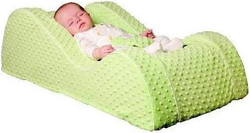 A manufacturer of baby recliners involved in five infant deaths is now the target of a lawsuit filed by the Consumer Product Safety Commission (CPSC).
A manufacturer of baby recliners involved in five infant deaths is now the target of a lawsuit filed by the Consumer Product Safety Commission (CPSC).
The CPSC filed a complaint against Baby Matters, LLC of Berwyn, Pennsylvania on Dec. 5 after the company refused to issue a voluntary recall of the Nap Nanny Generation One and Two and Chill models. The CPSC is aware of four infants who have died in Nap Nanny Generation Two recliners and one in a Chill model. It has received over 70 additional reports of children nearly falling out of the defective product.
The CPSC complaint alleges the company’s recliners contain defects in design, warnings and instructions, which pose a substantial risk of injury and death to infants. It seeks an order requiring the firm notify the public of the defect, remove it from store shelves and offer consumers a full refund. The company’s website and media reports state it has gone out of business as a result of its legal costs.
Some 155,000 of the recliners have been sold since 2009. The company sold 5,000 Nap Nanny Generation One models and 50,000 Nap Nanny Generation Two models between 2009 and early 2012. Both are now discontinued. A recall was issued in July 2010 announcing Generation One owners would receive an $80 coupon and improved instructions and warnings to consumers who owned the Generation Two Nap Nanny recliner.
The company developed the Nanny Chill model as an improvement. One hundred thousand Nap Nanny Chill models have been sold since January 2011. The recliners are priced about $130.
The 2010 recall came after the CPSC learned about one death that occurred in a Nap Nanny recliner and received 22 reports of infants hanging or falling out over the side, even though most had been harnessed in.
In a statement on the company’s website, owner/founder Leslie Gudel, said, “We do not believe the complaint has merit and stand behind the safety of our product when used as instructed.”
Later in the statement, she said, “No infant using the Nap Nanny properly has ever suffered an injury requiring medical attention. The Nap Nanny was designed and constructed for use only on the floor with the harness secured.”
Related:
Five infant deaths Prompt CPSC to Sue Manufacturer of Nap Nanny and Chill Infant Recliners, Consumer Product Safety Commission.
A message from Leslie Gudel – owner/founder Nap Nanny
Feds file suit against Nap Nanny maker after 5 infant deaths, 70 complaints, ABC News.
Read More
Meningitis Outbreak Prompts Federal and State Action on Compounding Pharmacies
A Massachusetts congressmen is proposing legislation that would give the Food and Drug Administration (FDA) greater authority over compounding pharmacies in the wake of a 19-state meningitis outbreak that has killed 29 people.
Rep. Edward Markey, (D., Mass.) last week announced the legislation, which would allow the FDA to inspect and regulate pharmacies partly based on their product volume.
Currently, states hold most of the authority over compounding pharmacies and the FDA is limited to inspections. It cannot require a compounding pharmacy to follow any operating standard.
Markey’s proposal aims to add oversight for compounding pharmacies which produce larger quantities. It does not target the traditional compounding pharmacy, which makes drugs for individual patients with a prescription.
The meningitis outbreak is being blamed on tainted steroid shots made by New England Compounding Center (NECC) of Framingham. As of Nov. 2, 395 people had contracted fungal meningitis, including the 29 deaths. Nine patients have fungal joint infections from steroid injections to the knee, hip, shoulder and elbow.
Officials say the defective drugs were shipped to 23 states and up to 14,000 patients may have been exposed. None of the contaminated product was distributed to Massachusetts healthcare providers or hospitals.
Markey’s proposal follows other attempts for regulation. In 1997, Congress passed a law giving the FDA authority to regulate large compounding pharmacies which advertised their products. But the U.S. Supreme Court struck down the law in 2002.
In Massachusetts, the Board of Registration in Pharmacy also moved to tighten controls last week, unanimously approving rules which allow the state to track drugs made by compounding pharmacies. The state’s goal is to determine whether a compounding pharmacy is violating its license and producing bulk quantities like a manufacturing facility. State officials say NECC was in violation of its license.
NECC has been shut down by the state and all of its products have been recalled. Another compounding pharmacy under the same ownership, Ameridose of Westborough, also recalled all of its drugs last week. On Oct. 10, Ameridose agreed to a temporary shutdown, which has been extended until Nov. 19.
State officials are seeking permanent surrender of NECC’s pharmacy license and permanent license revocation for NECC’s three pharmacists. The state has also started inspecting other compounding pharmacies, one of which has agreed to surrender its license after violations were found.
The Federal Bureau of Investigation (FBI) has launched a criminal investigation and at least three people have also filed personal injury lawsuits, reports USA Today.
Related:
Insight: How compounding pharmacies rallied patients to fight regulation, Reuters.
Harsh punishments rare for drug compounding mistakes, USA Today.
Pharmacy board adopts new rules, The Boston Globe.
Meningitis outbreak nears 400 infected as lawmakers push for tougher regulation, Associated Press/CBS News.
Read More
Contaminated Steroid Injections Trigger Outbreak in 23 States, 5 Deaths
Five people have died and at least 35 have fallen ill after being injected with a steroid which was contaminated with fungus from a Massachusetts compounding pharmacy.
The steroid was shipped to 75 health centers in 23 states, not including Massachusetts, according to media reports. Patients treated with the steroid in six states have fallen ill and died from aspergillus meningitis. Symptoms of this rare infection include headache fever, nausea and pain at the injection site.
The steroid was produced at New England Compounding Center of Framingham, Massachusetts. The company first recalled three lots of methylprednisolone acetate last week. This week, the Food and Drug Administration (FDA) has expanded the recall to include all injectable spinal drugs made by New England Compounding Center. The FDA is further urging health care providers to discard all products from the company as a precaution.
The 35 people who were stricken ill were treated with epidural injections of methylprednisolone acetate for lower back pain between July and September. The infected patients are from Tennessee, Virginia, Maryland, Florida, North Carolina and Indiana. Patients are still being notified. No Massachusetts facilities received the defective steroid injections, but there were shipments within New England to health care providers in Connecticut, Rhode Island and New Hampshire.
Nine Massachusetts health facilities did receive methylprednisolone acetate from other lots made by New England Compounding Center, but no cases of fungus meningitis have been reported.
New England Compounding Center has voluntarily given up its state license and ceased operation. Investigators this week found a contaminated sealed vial of steroid at the company, the FDA reported, and testing is being performed to determine if it is the same fungus as the outbreak.
The Boston Globe reported a state official said the Massachusetts Board of Registration in Pharmacy received complaints about the company in 2002 and 2003. The board worked with the company to improve conditions, but the official did not share details. The board is still investigating another complaint received in March about eye medications.
In 2006, the FDA sent the company a letter stating concerns including its splitting and repacking of the injectable colorectal cancer drug Avastin.
The case shines a light on regulations regarding pharmacies which prepare custom medications, often for patients who have allergies to other medications or for treatments which are no longer commercially available.
New England Compounding Center was not accredited by the Pharmacy Compounding Accreditation Board, which conducts a site visit and review of pharmacy every three years. The accreditation is voluntary.
Related:
5 deaths now tied to rare fungal meningitis possibly contracted from steroids prepared by Massachusetts pharmacy, Boston Globe.
Hundreds seen at risk in meningitis outbreak, Associated Press.
Massachusetts Board of Registration in Pharmacy.
DePuy Hip Implant Cases Settled for $600,000
Johnson & Johnson has agreed to pay about $600,000 to resolve three product liability cases involving its DePuy hip implants, which were recalled in 2010 after hundreds of patient complaints and a study emerged revealing a substantial device failure rate.
The New Jersey-based company settled the cases of three women who had filed claims in a Las Vegas court. All three women had required a second hip revision surgery to treat and correct their pain. Each will receive about $200,000. The cases had been scheduled for trial Dec. 3.
The next three lawsuits involving defective DePuy hip implants are set for January in a Maryland state court.
In August 2010, Johnson & Johnson’s DePuy unit recalled 93,000 of its ASR hip implants globally and 37,000 in the United States. The recall was announced alongside results of a study from a UK joint replacement registry, which showed 12 percent of patients required a second revision surgery within five years. The Food and Drug Administration (FDA) also reported it had received about 400 complaints from patients in the two years prior.
Since the DePuy hip recall, more than 8,000 patients across the country have filed lawsuits against the medical device maker, alleging the ASR hips are defective. About 6,000 of these have filed in federal court.
Patients claim the DePuy metal-on-metal hip implants are defective, saying they caused friction between the metallic ball and socket components. The recalled DePuy hip implant can wear down and produce metallic particles in patients’ bloodstreams, along with pain, joint dislocations, infections and bone fractures.
Johnson & Johnson said it has spent about $800 million on the hip implant recall.
Related:
- J&J said to pay $600,000 to settle first suits over hips, Bloomberg Business Week.
- DePuy hip implant recall leads insurers to seek recovery, Massachusetts Injury Lawyer Blog.
Toyota Recalls 550,000 Toyotas and Lexus Models
 A defective crankshaft pulley is driving a new Toyota recall that will affect thousands of car owners. The Nov. 8 recall of 550,000 vehicles includes 420,000 cars in the United States. Toyota has now issued recalls for more than 13 million vehicles nationwide since September 2009. More vehicles have been recalled in other countries.
A defective crankshaft pulley is driving a new Toyota recall that will affect thousands of car owners. The Nov. 8 recall of 550,000 vehicles includes 420,000 cars in the United States. Toyota has now issued recalls for more than 13 million vehicles nationwide since September 2009. More vehicles have been recalled in other countries.
Toyota recalled the vehicles due to a crankshaft pulley defect that may cause steering problems. The vehicles have V6 engines and the U.S. models include 283,200 Toyota brand cars like Camry and Highlander vehicles and 137,000 Lexus vehicles.
Toyota said no injuries have been reported. The car manufacturer said the crankshaft pulley may have an inadequate amount of adhesive agent between the outer ring and the inner ring. This can cause the crankshaft pulley to become misaligned with the inner ring, possibly causing a noise or warning signal to light. When this happens, the belt for the power steering pump can detach from the pulley, making it hard for drivers to steer.
Toyota recalled 8 million vehicles between Nov. 2009 and the first quarter of 2010, most for defective pedals. In April 2010, the United States government fined the world’s largest automaker a record $16 million for its delayed response in notifying the National Highway Traffic Safety Administration regarding the defects.
Recalls have continued through 2011, including last February’s recall of 2.17 million vehicles to repair mechanical defects that could cause the cars to accelerate out of control.
The Nov. 8 recall involves these defective motor vehicles: the 2004 and 2005 Camry, Highlander, Sienna and Solara; the 2004 Avalon; and the 2006 Highlander HV. The affected Lexus models are the 2004 and 2005 ES 330 and RX 330 and the 2006 RX 400h.
In January, Toyota will mail car owners a notification to make an appointment to have their vehicle inspected. Toyota will fix any vehicle in need of repair at no cost to consumers.
Read More
Product Safety Alert: Maytag Recalls 1.7 Million Dishwashers
Maytag Corp. has recalled 1.7 million dishwashers across the United States, citing an electrical failure.The company, which is owned by Whirlpool Corp., issued the recall last week after 12 reports of electrical problems which pose a fire hazard.
Maytag recalled its Maytag, Amana, Jenn-Air, Admiral, Magic Chef, Performa by Maytag and Crosley brand dishwashers with plastic tubs and certain serial numbers. The Consumer Product Safety Commission (CPSC) and Maytag officials say the electrical failures caused by the defective products have caused property damage.
“Product safety is a major concern here because we use our dishwashers daily,” said Boston product liability lawyer Marc L. Breakstone. “We advise consumers to immediately stop using the dishwashers and to have them repaired or to replace them as soon as possible.”
The 12 electrical failure reports included one case of extensive kitchen damage. No injuries have been reported in Massachusetts or other states.
The CPSC advised consumers to immediately stop using the recalled dishwashers and disconnect the electrical supply by shutting off the circuit breaker or pulling the fuse.
Consumers can obtain free in-home repair of the recalled Maytag dishwashers or a $150 to $250 rebate toward a new model. The Maytag dishwasher recall impacts models priced $250 to $900.
If you suspect your dishwasher’s involved in the product safety recall, click here for the full list of serial numbers and for how to obtain a refund or repair.


